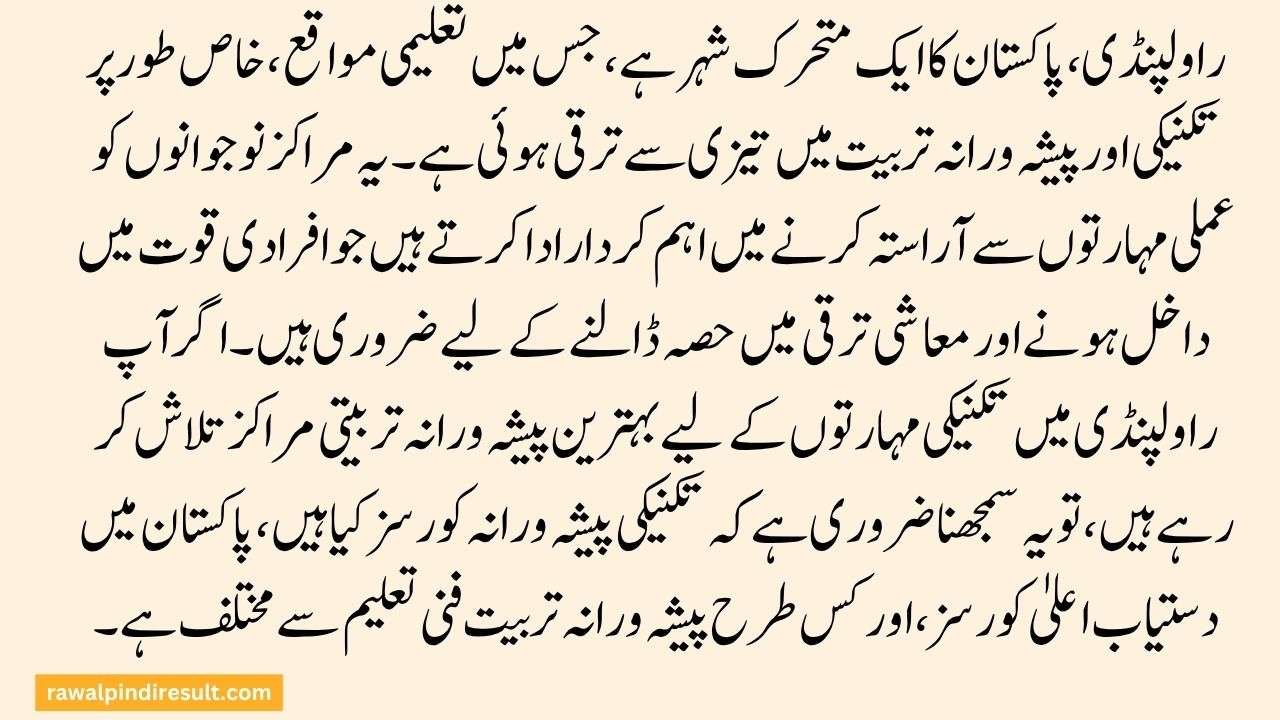Rawalpindi, a vibrant city in Pakistan, has seen rapid development in educational opportunities, especially in technical and vocational training. These centers play a vital role in equipping youth with practical skills that are essential for entering the workforce and contributing to economic growth. If you’re looking for the best vocational training centers for technical skills in Rawalpindi, it’s important to understand what technical vocational courses entail, the top courses available in Pakistan, and how vocational training differs from technical education.
Which Institute is Best for Vocational Training in Rawalpindi?
Rawalpindi hosts several reputable vocational training institutes offering diverse technical courses tailored to the demands of the job market. Among them, the following are highly regarded:
1. Technical Education and Vocational Training (TEVTA) Rawalpindi
TEVTA is a government agency responsible for managing vocational training in Punjab, including Rawalpindi. It offers a variety of technical courses such as electrical, mechanical, welding, automotive repair, and computer skills. TEVTA institutes are affordable and provide certification recognized by industries nationwide.
2. National Vocational and Technical Training (NAVTTC) Center
NAVTTC partners with local centers to provide courses in HVAC, plumbing, IT networking, and graphic design. These programs are designed to meet international standards, providing students with enhanced employment opportunities.
3. Pakistan Institute of Technical Education (PITE) Rawalpindi
PITE offers professional diplomas and short-term technical courses. The curriculum is regularly updated to keep up with technological advancements and market demands. They focus on hands-on training supported by qualified instructors.
4. Private Vocational Training Centers
Several private centers in Rawalpindi specialize in niche technical areas such as web development, digital marketing, CNC machining, and mobile repair. While often pricier, they provide flexible schedules and modern equipment.
Among these, TEVTA Rawalpindi is often considered the best due to its comprehensive course offerings, government support, and affordability. However, your choice should depend on the specific skill you wish to acquire, course duration, and budget.
What is a Technical Vocational Course?
A technical vocational course is a specialized training program designed to develop practical skills and knowledge in a specific trade or profession. Unlike traditional academic education, which focuses more on theoretical understanding, vocational courses emphasize hands-on experience and technical proficiency.
These courses cover a wide range of skills related to industries such as manufacturing, construction, information technology, automotive repair, electrical work, plumbing, and more. The primary goal is to prepare learners for immediate employment or self-employment by equipping them with job-ready competencies.
Vocational courses combine classroom instruction with on-the-job training or apprenticeships, lasting a few weeks to several months, depending on the skill complexity.
Which Technical Course is Best in Pakistan?
Choosing the best technical course in Pakistan depends largely on market demand, future career prospects, and personal interests. However, based on current trends and job opportunities, here are some of the top technical courses:
1. Information Technology (IT) and Software Development
High demand for courses in programming languages like Python, Java, C++, web development, mobile app development, and cybersecurity is evident. Pakistan’s growing tech industry offers numerous job opportunities locally and internationally.
2. Electrical Engineering and Electronics
Training in electrical systems, circuit design, and electronics maintenance is essential for industries such as energy, manufacturing, and telecommunications.
3. Welding and Fabrication
With the expansion of infrastructure and industrial projects, skilled welders and fabricators are required across many sectors, including construction and shipbuilding.
4. Automotive Mechanics and Repair
Vehicle servicing and repair remain vital, especially with an increasing number of vehicles on Pakistan’s roads.
5. HVAC (Heating, Ventilation, and Air Conditioning)
Technicians specialized in HVAC systems are in demand in residential, commercial, and industrial sectors.

6. Graphic Designing and Digital Media
As businesses embrace digital marketing, courses in graphic design, video editing, and animation are becoming popular.
7. Plumbing and Sanitation
Essential for both urban and rural development projects, plumbing skills ensure safe water supply and waste management.
Among these, IT and software development stand out due to the global demand for tech professionals and the relatively high earning potential.
Technical Education
Technical Education refers to the formal academic instruction in technical fields. It usually takes place in technical colleges, polytechnics, or universities and includes theoretical and practical learning. Technical education prepares students for engineering, technology development, and scientific research careers. Programs might span multiple years and result in diplomas, degrees, or certificates.
Example: A diploma in electrical engineering or a bachelor’s degree in computer science.
Vocational Training
Vocational Training, on the other hand, is more focused on developing specific skills for direct application in a trade or occupation. It is often shorter in duration and more hands-on. Vocational training is aimed at enabling learners to enter the workforce quickly and efficiently.
In short, Technical education is broader and more theoretical, often leading to professional and managerial roles, whereas vocational training is skill-specific and practical, preparing students for manual or technical jobs.
Why Vocational Training is Crucial for Rawalpindi’s Youth?
Rawalpindi’s growing industrial and commercial sectors need skilled workers to sustain development. Vocational training provides a pathway for many young people who may not have access to traditional academic routes to gain meaningful employment. These courses help reduce unemployment, encourage entrepreneurship, and contribute to economic stability.
Moreover, vocational training promotes inclusivity by offering education to those from diverse socioeconomic backgrounds, including women and disadvantaged communities.
Conclusion
If you’re seeking to acquire technical skills in Rawalpindi, vocational training centers like TEVTA and NAVTTC provide reliable and recognized programs tailored to industry needs. Technical vocational courses are specialized training programs focused on practical skills that can immediately boost employability. Pakistan’s best technical courses currently include IT, electrical engineering, welding, and HVAC, among others. Understanding the distinction between technical education and vocational training helps learners choose the right educational path based on their career goals.
Investing in vocational training is a smart move for anyone looking to gain hands-on skills, increase job prospects, and contribute positively to Pakistan’s growing economy.

